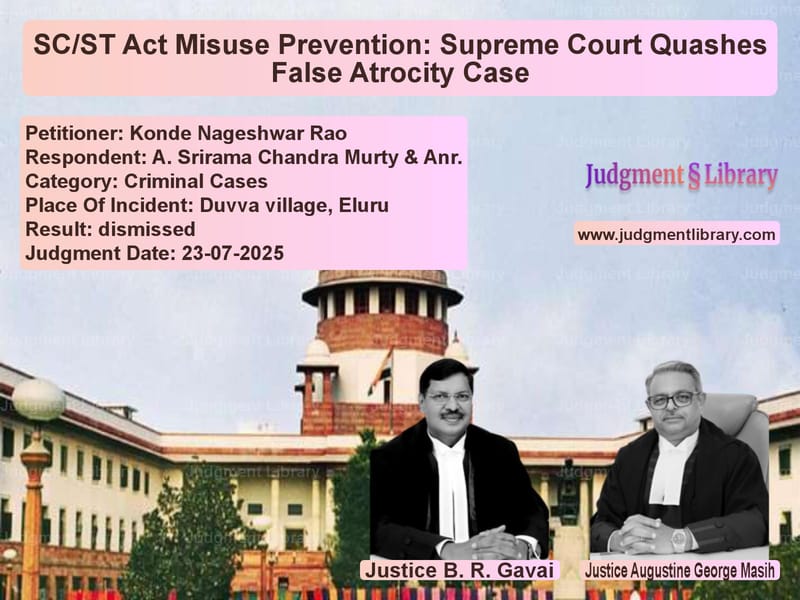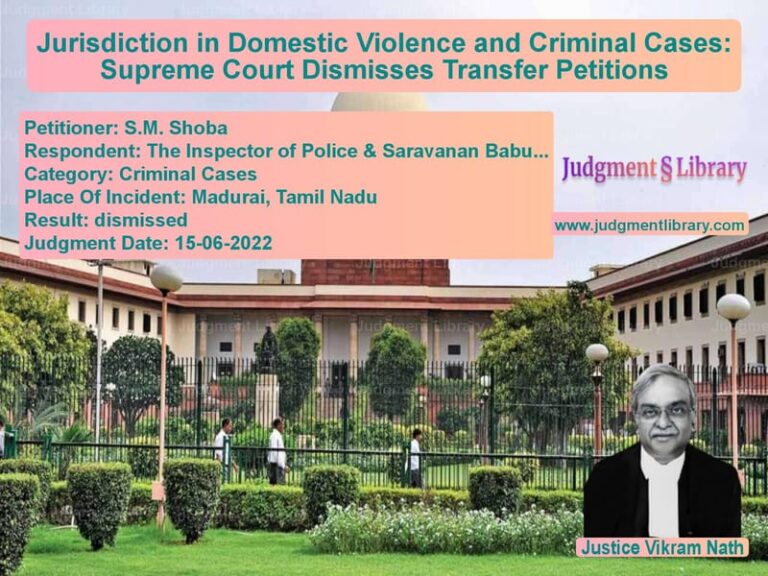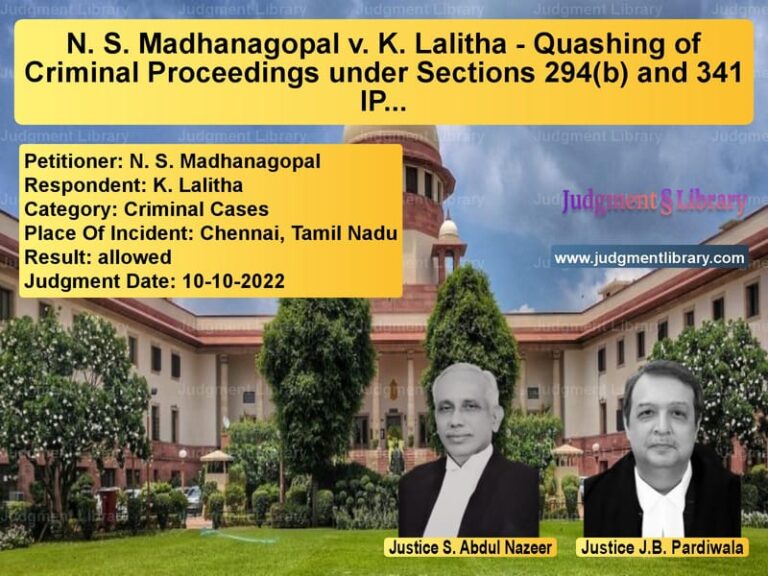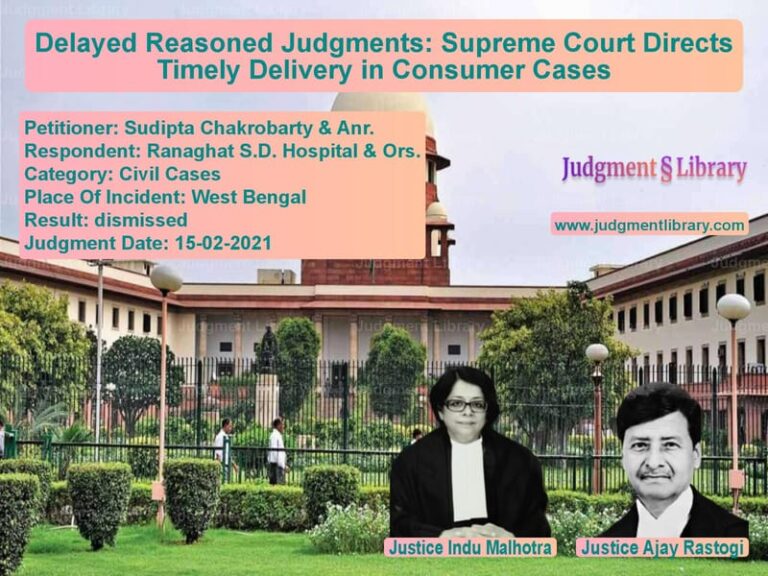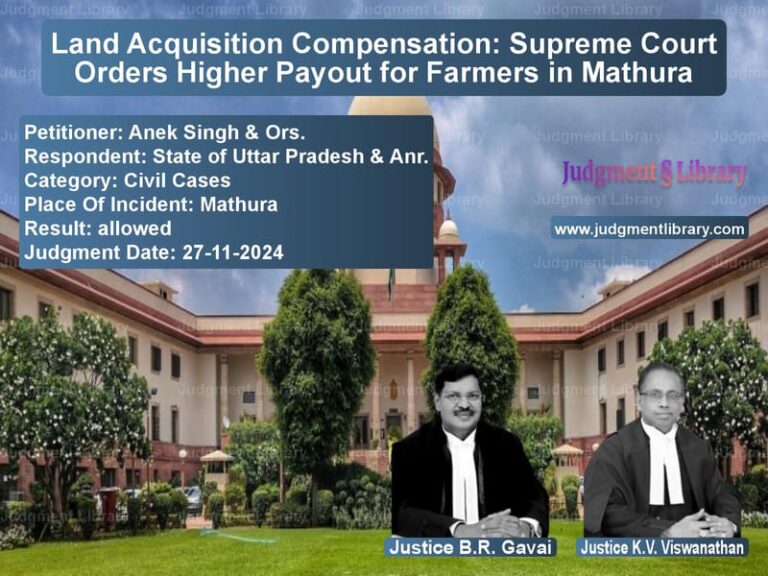SC/ST Act Misuse Prevention: Supreme Court Quashes False Atrocity Case
In a significant ruling that addresses the growing concern of misuse of protective legislation, the Supreme Court has dismissed an appeal challenging the quashing of criminal proceedings under the Scheduled Castes and Scheduled Tribes (Prevention of Atrocities) Act, 1989. The case involved serious allegations of false implication in criminal cases as retaliation for exposing alleged irregularities in land allotment meant for SC/ST beneficiaries.
The legal battle began when Konde Nageshwar Rao, a Junior Accountant working in Government Printing Press at Hyderabad, filed a complaint against A. Srirama Chandra Murty, the Mandal Revenue Officer, and a police sub-inspector, alleging that they had falsely implicated him in a criminal case as retaliation for his complaint about wrongful allotment of plots reserved for Scheduled Caste beneficiaries to upper-caste individuals. The case originated from Duvva village where the appellant alleged that the MRO had manipulated the allotment of two plots to upper-caste individuals related to the proprietor of Ramakrishna Cine Theatre, despite these plots being earmarked for SC/ST beneficiaries.
The appellant’s objection to this allotment led to what he claimed was a conspiracy to falsely implicate him in a criminal case. He was placed under suspension from his government job due to the criminal case, though it was later found that he wasn’t even present in the village when the alleged offense occurred. The criminal proceedings against him were eventually dropped after a competent authority found him innocent.
Following the withdrawal of prosecution against him, the appellant filed a complaint against the respondents under the SC/ST Act, alleging that they had conspired to implicate him and his brother falsely in a rioting case relating to a clash between two Scheduled Caste groups. After investigation by a Deputy Superintendent of Police, the allegations were found substantiated, and a complaint was filed after obtaining proper sanction for prosecution.
Arguments of the Parties
The appellant’s counsel contended that the High Court erred in exercising its jurisdiction under Section 482 of the Code of Criminal Procedure, 1973. There was overwhelming evidence in the form of 39 witnesses and substantial incriminating material against the respondents, establishing a strong prima facie case under Section 3(1)(viii), (ix) & (3)(2)(vii) of the SC/ST Act. The scope of Section 482, according to the counsel, is limited and should be invoked only in cases where no alternative remedy is available to the accused. The Trial Court, at the stage of framing of the charge, would be competent to assess the prima facie evidence and discharge the accused if the material is insufficient. The High Court exceeded its jurisdiction by engaging in a roving inquiry into the prosecution case instead of confining itself to determining whether the allegations disclosed a cognizable offence. Proper appreciation of the material gathered by the investigating agency was not carried out and, in any case, the same should have been left to the trial court. The High Court has overstepped its authority while exercising its extraordinary jurisdiction by approaching the case in a manner of evaluating the evidence, which is impermissible by way of a superficial reading of the case record, which has led to erroneous conclusions that undermine the incriminating evidence on record. The credibility of the witness statements and merits of the prosecution case cannot be adjudged by the High Court at the pre-trial stage. The Court should have left the assessment of the veracity of the evidence of the witnesses and the prosecution case to the trial court.
On the other hand, Learned Counsel for the Private Respondent No. 2, the MRO, has submitted that there was no mala fide intention on the part of the private respondents as they were performing the duties assigned to them by following the government guidelines and instructions from their superiors. The allegations against them are false, motivated, and time barred. Rather, it is the mala fide intention on the part of the Appellant to seek revenge because of the evidence collected regarding his involvement in the group clash. Reliance has been placed on the report of the Sub-Collector, Kovvur, who returned a finding that there was no mala fide intention on the part of the private respondents, especially the MRO. The action taken by him with regard to the allotment of the plots, were according to the government instructions, leading to the dropping of the departmental proceedings initiated against Respondent No. 2 by the department.
As regards the evidence which had been collected against the Appellant during the investigation of the criminal case of the year 1995 relating to the group clash, statements were recorded of the injured parties who had named him, establishing his presence. The arrest of the Appellant and his family members was made only after the directions were issued by the Sub-Collector and the SDM, Kovvur, to the Station House Officer. Submission has also been made that the withdrawal of prosecution against the Appellant by the government at the very initial stage, as ordered, does not reflect that the Appellant was wrongly implicated as an accused, as evidence of none of the witnesses and their veracity was tested before the court.
Court’s Analysis and Important Arguments
The Supreme Court, after careful consideration of the facts and arguments, upheld the High Court’s decision to quash the proceedings. The Court made several important observations about the application of the SC/ST Act and the need to prevent its misuse.
The Court noted that the prosecution initiated against the private respondents was based upon a complaint filed by the Appellant on the dropping of and the withdrawal from prosecution in criminal case qua him. It is at this stage that the allegations of mala fide and wrongful prosecution at the behest of Respondent No. 2, the MRO, and Accused No. 3, proprietor of Ramakrishna Theatre, who is alleged to have colluded with Respondent No. 1, the Sub-Inspector of Police, who was the Investigating Officer. Respondent No. 1 falsely implicated the Appellant and his younger brother as accused in the rioting case relating to the clash between two groups belonging to the Scheduled Caste.
The Court emphasized that It is an admitted position that, on the complaint, initially, it was prima facie observed to be correct but on detailed inquiry and on clarification, it turned out that the allotment made by Respondent No. 2 was as per the government instructions. In any case, the cancellation of allotment had taken place. Therefore, there was no reason as to why Respondent No. 2 would proceed to malafidely involve the Appellant and his family in the case. That apart, since it was admittedly a dispute between two groups belonging to the Scheduled Caste, and the clash was not with any other community, rather intra-caste, involvement of the Appellant because of him being a Scheduled Caste in the criminal case does not arise, what to say of mala fide. No evidence has been brought on record which would indicate mala fide intention on the part of Respondent No. 2 or any connivance. The bald allegations against the Appellant would not in itself be sustainable.
The Court further observed that Perusal of the complaint would also indicate that the grievance was not really relatable to the false and malicious involvement in the criminal proceedings against the Appellant and his family members because of them belonging to Scheduled Caste. The very intent being absent, the offences for which the prosecution has been launched are not made out. That apart, merely because a number of cases and various litigations are pending between the Appellant and Respondent No. 2, in itself cannot be a ground for presuming that the prosecution initiated against the appellant was at the behest of and with a false and malicious intent, by now deceased Respondent No. 1. For attracting the offences, as alleged to have been committed by the private respondents, specific instances and incidents supported by evidence are required to be present, which is missing in this case.
The Supreme Court relied on important precedents to support its reasoning. In Masumsha Hasanasha Musalman v. State of Maharashtra, this Court has emphasized that merely because the complainant belongs to the Scheduled Castes or Scheduled Tribes cannot be the sole ground for prosecution. The offences alleged must have been committed solely on the basis of the victim’s caste status. Misuse of the statute to settle personal scores or to harass individuals cannot be permitted if it is apparent. The Court should in such situation be not hesitant to step in and stop the said misuse. Prosecution needs to be quashed at an early stage to prevent undue harassment of the accused where there is clear legal infirmity in the prosecution case, such as the allegations, even if taken at their face value, do not disclose an offence or the entire case is a bad faith exercise weaponized to settle personal scores, rather than seeking justice.
This court in Dr. Subhash Kashinath Mahajan v. State of Maharashtra and another had also observed that there has been an alarming increase in false complaints under the SC/ST Act, particularly against public servants and judicial officers with an oblique motive to settle personal scores or to harass individuals. Such acts cannot be allowed to be perpetuated and need to be stopped at the very outset so that there is no miscarriage of justice.
Court’s Final Ruling
The Supreme Court concluded that The observations and conclusions arrived at by the High Court are based upon the proper appreciation of the pleadings, the correct reading and application of law and thus, cannot be faulted with. The impugned order dated 15.10.2014 as passed by the High Court being in accordance with law does not call for any interference.
The appeal was accordingly dismissed, upholding the High Court’s decision to quash the proceedings under the SC/ST Act against the respondents. This judgment reinforces the judiciary’s role in preventing the misuse of protective legislation while ensuring that genuine cases of caste-based discrimination continue to receive appropriate legal protection.
The ruling serves as an important reminder that while laws like the SC/ST Act are crucial for protecting marginalized communities from discrimination and atrocities, they should not be weaponized to settle personal scores or harass individuals. The courts have a responsibility to examine each case on its merits and ensure that the legal process is not abused for extraneous purposes.
Petitioner Name: Konde Nageshwar Rao.Respondent Name: A. Srirama Chandra Murty & Anr..Judgment By: Justice B. R. Gavai, Justice Augustine George Masih.Place Of Incident: Duvva village, Eluru.Judgment Date: 23-07-2025.Result: dismissed.
Don’t miss out on the full details! Download the complete judgment in PDF format below and gain valuable insights instantly!
Download Judgment: konde-nageshwar-rao-vs-a.-srirama-chandra-m-supreme-court-of-india-judgment-dated-23-07-2025.pdf
Directly Download Judgment: Directly download this Judgment
See all petitions in SC/ST Act Case
See all petitions in Judgment by B R Gavai
See all petitions in Judgment by Augustine George Masih
See all petitions in dismissed
See all petitions in supreme court of India judgments July 2025
See all petitions in 2025 judgments
See all posts in Criminal Cases Category
See all allowed petitions in Criminal Cases Category
See all Dismissed petitions in Criminal Cases Category
See all partially allowed petitions in Criminal Cases Category

